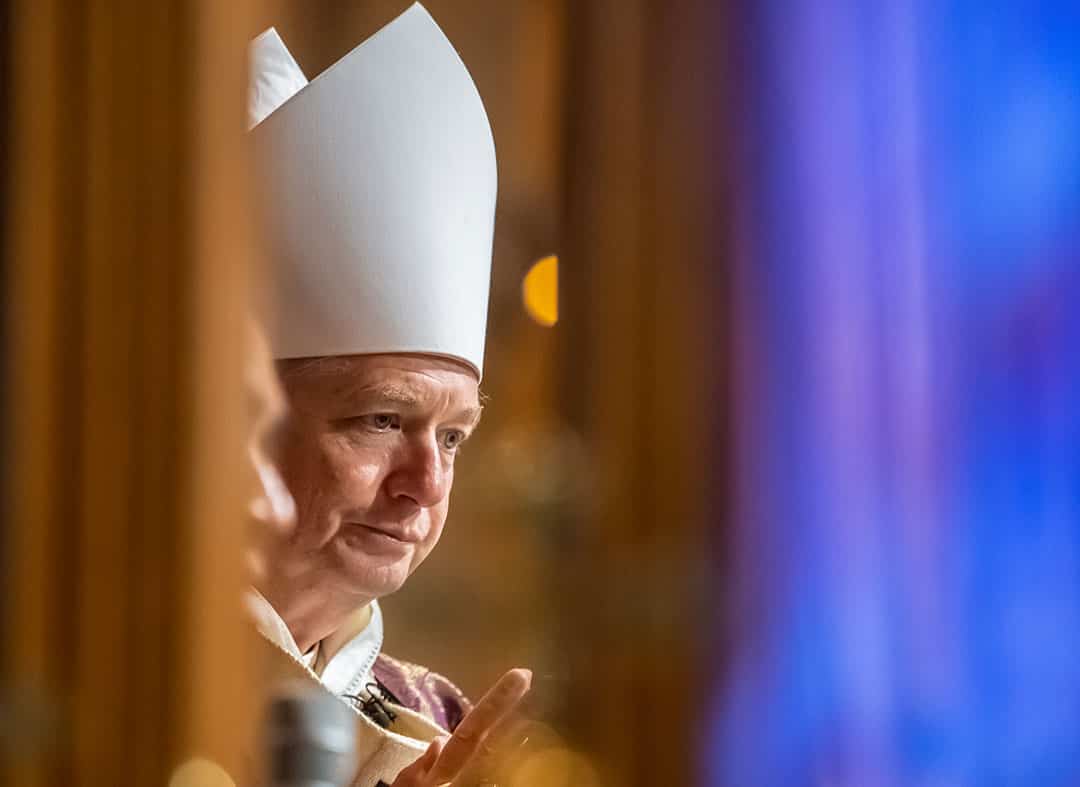
Archbishop Anthony Fisher OP has launched a scathing attack on proposed euthanasia laws in NSW, warning there are inadequate safeguards in them to prevent people with mental illness from qualifying for euthanasia and to protect Catholic aged care homes from having to carry out euthanasia on their premises.
The Archbishop was speaking at an online Zoom forum, Choosing Death for the Dying, organised by Sydney Catholic Youth on 28 July which brought together 270 attendees, including hundreds of young adults as well as teachers and school principals.
NSW Independent MP, Alex Greenwich intended to table a private members’ bill on euthanasia on 12 August, but with parliamentary sittings adjourned in August, it is unclear when Mr Greenwich will push ahead with his plans.
Under Mr Greenwich’s Voluntary Assisted Dying Bill, doctors would be allowed to suggest euthanasia to their patients, as long as information about treatment options and palliative care is also provided.
“Till recently it’s been a defining principle of our healthcare professions that they never kill or harm their patients or assist others to do so.”
Mental illness- including a diagnosis of clinical depression- would not prevent a person from accessing euthanasia or assisted suicide and faith-based aged care facilities that object to euthanasia would still need to allow doctors and nurses on to the premises for every stage of the euthanasia process, including allowing them to enter and kill a patient on site.
Archbishop Fisher has warned the proposed laws contravene not only basic Christian principles, but also those followed for centuries by the medical profession as well.
“Till recently it’s been a defining principle of our healthcare professions that they never kill or harm their patients or assist others to do so. International and national codes of medical and nursing ethics all the way back to Hippocrates have all forbidden killing by health professionals: they are healers not killers”, Archbishop Fisher told the forum of mainly young Catholics.
“Some people clearly want to make exceptions, but have they thought through how that will change the professions of medicine and nursing and change the professionals themselves? Do we want our health professionals assessing who should live and who should die?”
Archbishop Fisher said the experience in overseas countries which have implemented euthanasia laws has highlighted how they can be easily extended to cover children and even new-borns.
“The Dutch introduced voluntary euthanasia in the 1980s and 1990s, but by the 2000s, they allowed non-voluntary euthanasia for new-borns. What was supposed to be for the extreme cases of unrelievable suffering, is now the standard way of dying for 5000 people a year in the Netherlands”, he warned.
“The Belgian parliament legalised euthanasia in 2002 with an ‘R’ rating- for adults only: a decade later it got a ‘G’ rating for children.
Already in the short experience of Voluntary Assisted Dying in Victoria, many times more people have availed themselves of it than was predicted at the time it was passed. Up until the end of last year, 224 people died from Voluntary Assisted Dying in Victoria with another 181 being given the means to do so and many of them may have since died.
“Archbishop Fisher urged those attending the forum to sign a petition to Premier Gladys Berejiklian, urging her to reject the laws, as well as to write to their local MPs calling on them to oppose the laws as well.”
Yet when euthanasia was passed in Victoria, Premier Daniel Andrews said he expected about a dozen people to use these laws per year”, Archbishop Fisher explained.
The Archbishop said his personal experience of having recovered from a life-threatening illness himself, over five years ago, has left him more convinced of the importance of opposing euthanasia laws.
Archbishop Fisher was diagnosed with Guillain Barre Syndrome in late 2015, an illness which left him totally paralysed from the neck-down, but he recovered after five months of hospital treatment along with the prayers and support of many.
“I experienced first-hand the paradox of the human body unresponsive to the human spirit.

I had terrible pain. I knew the humiliation of baby-like dependency. But I also witnessed the triumph of the human spirit in the care people received, in the determination of some to conquer their disability or suffering or at least accommodate it and get on with their lives”, he said.
“After myself suffering a terribly debilitating and potentially lethal sickness, I became more convinced than ever that, whatever the motives and the rhetoric, a euthanasia regime will neither relieve suffering nor respect freedom: rather, it will mean those who are suffering will suffer more and those whose freedom is already limited will be even less free.”
Archbishop Fisher urged those attending the forum to sign a petition to Premier Gladys Berejiklian, urging her to reject the laws, as well as to write to their local MPs calling on them to oppose the laws as well.
Sydney Catholic Youth Team Leader, Mr Chris Lee, said the Archbishop’s talk left many young Catholics with a far better understanding of the important issue of euthanasia and what action they can take to build up a pro-life culture in NSW.
“Our politicians are constantly emphasising the importance of protecting the lives of the vulnerable in this time of pandemic and yet at the same time, they are trying to push forward with a bill that directly contradicts that same principle.”
“They look up to the Archbishop as their shepherd and when he speaks with authority on an issue such as this one, they felt a lot more empowered as young people to now go out and do all they can to campaign against euthanasia”, he said.
One of the attendees, a Religious Education teacher, Isabella Plust, said the talk was very thought-provoking and left her questioning the poor judgement of some politicians pushing for euthanasia laws which would end up hurting some of society’s most disadvantaged.
“Our politicians are constantly emphasising the importance of protecting the lives of the vulnerable in this time of pandemic and yet at the same time, they are trying to push forward with a bill, under people’s noses, that directly contradicts that same principle, which doesn’t make sense at all”, she said.
The No Euthanasia petition is available online here: https://www.noeuthanasia.org.au/protect_life_nsw
Related Articles:
